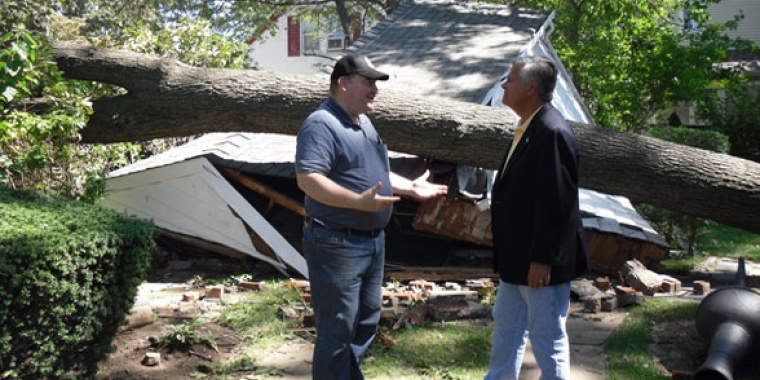
Senator Skelos Provides Tips for Residents and Businesses in Irene’s Aftermath
Dean G. Skelos
August 29, 2011

New York State Senate Majority Leader Dean G. Skelos (R, Rockville Centre) today provided tips and other useful information for residents and businesses impacted by Hurricane Irene.
“Whether you are only now returning to your home or business or if you have begun the process of documenting damages, it is important to know what steps to follow to ensure you and your property are safe,” Senator Skelos said. “The information below should be useful throughout the anticipated lengthy process of cleanup and recovery for those who have experienced property damage from the flooding and winds.”
Today at Long Beach City Hall, 1 West Chester St., the State Insurance Department's Mobile Command Center (MCC) will be available to assist area residents with insurance-related questions. The MCC is a 50-foot-long van equipped with high-speed internet access and telephone equipment that is being used to help property owners file claims and contact their insurance companies. Insurance Department personnel will also be available to answer consumers' questions and a hotline has also been established: 800-339-1759.
Nassau County residents can also call the following phone numbers for assistance:
· Nassau County Office of Emergency Management: 888-684-4274 and 516-573-0636. Residents should only contact 911 if there is a life-threatening emergency. http://www.nassaucountyny.gov/agencies/OEM/index.html
· Nassau County Red Cross: 516-747-3500 http://www.nyredcross.org/
· LIPA: (to report downed power lines or an electrical emergency): 1-800-490-0075 http://www.lipower.org/
· Nassau County Police Department (general): 516-573-7000 http://www.police.co.nassau.ny.us/site_index.htm
FOR THOSE EVACUATED AND RETURNING HOME:
FEMA suggests walking carefully around the outside and check for loose power lines, gas leaks, and structural damage. If you have any doubts about safety, have your residence inspected by a qualified building inspector or structural engineer before entering.
Do not enter if you smell gas, floodwaters remain around the building or your home was damaged by fire and the authorities have not declared it safe.
FOR ALL PROPERTY OWNERS:
When you go inside your home, there are certain things you should do. Enter the home carefully and check for damage. Be aware of loose boards and slippery floors. The following items are other things to check inside your home:
· Natural gas. If you smell gas or hear a hissing or blowing sound, open a window and leave immediately. Turn off the main gas valve from the outside, if you can. Call the gas company from a neighbor’s residence. If you shut off the gas supply at the main valve, you will need a professional to turn it back on. Do not smoke or use oil, gas lanterns, candles, or torches for lighting inside a damaged home until you are sure there is no leaking gas or other flammable materials present.
· Sparks, broken or frayed wires. Check the electrical system unless you are wet, standing in water, or unsure of your safety. If possible, turn off the electricity at the main fuse box or circuit breaker. If the situation is unsafe, leave the building and call for help. Do not turn on the lights until you are sure they’re safe to use. You may want to have an electrician inspect your wiring.
· Roof, foundation, and chimney cracks. If it looks like the building may collapse, leave immediately.
· Appliances. If appliances are wet, turn off the electricity at the main fuse box or circuit breaker. Then, unplug appliances and let them dry out. Have appliances checked by a professional before using them again. Also, have the electrical system checked by an electrician before turning the power back on.
· Water and sewage systems. If pipes are damaged, turn off the main water valve. Check with local authorities before using any water; the water could be contaminated. Pump out wells and have the water tested by authorities before drinking. Do not flush toilets until you know that sewage lines are intact.
· Food and other supplies. Throw out all food and other supplies that you suspect may have become contaminated or come in to contact with floodwater. If your basement has flooded, pump it out gradually (about one third of the water per day) to avoid damage. The walls may collapse and the floor may buckle if the basement is pumped out while the surrounding ground is still waterlogged.
· Open cabinets. Be alert for objects that may fall.
· Clean up household chemical spills. Disinfect items that may have been contaminated by raw sewage, bacteria, or chemicals. Also, clean salvageable items.
If you have property damage and need an insurance claim filed:
The State Insurance Department recommends the following steps to help facilitate a smooth insurance claim:
· The first step to getting your home restored is to contact your insurance company and/or agent with your policy number and other relevant information. Be aware that your policy might require that you make this notification within a certain time frame.
· Take photographs or video of the damage before clean-up or repairs. After you've documented the damage, make repairs necessary to prevent further damage to your property, such as covering broken windows, leaking roofs and damaged walls. DO NOT have permanent repairs made until your insurance company has inspected the property and you have reached an agreement on the cost of repairs. Be prepared to provide the claims adjuster with records of any improvements you made prior to the damage. Save all receipts, including those from the temporary repairs.
· If your home is damaged to the extent that you cannot live there, ask your insurance company or insurance agent if you have coverage for additional living expenses.
· Ask what documents, forms and data you will need to file the claim. Keep a diary of all conversations you have with the insurance company and your insurance agent, including names, times and dates of the calls or visits and contact details.
· Be certain to give your insurance company all the information they need. Incorrect or incomplete information may cause a delay in processing your claim.
· If the first offer made by the insurance company does not meet your expectations, be prepared to negotiate. If there is a disagreement about the claim, ask the company for the specific language in the policy in question and determine why you and the company interpret your policy differently. If you believe you are being treated unfairly, contact the Insurance Department at www.ins.state.ny.us. You can file a complaint about an insurance company at http://www.ins.state.ny.us/complhow.htm.
· Consumers should contact their insurance company, agent or broker to get answers to specific questions about their policies. Consumers who need further help should feel free to contact the New York State Insurance Department’s Consumer Services Bureau at 800-342-3736 which operates from 9 a.m. to 4:30 p.m., Monday through Friday. Disaster related calls only should go to the Department’s disaster hotline at 800-339-1759, which will be open from 8 a.m. to 8 p.m. for as long as needed.
Other important contact information:
Senator Skelos’ District Office: 516-766-8383
Access to Federal Disaster Assistance and Resources: http://www.disasterassistance.gov
New York State Office of Emergency Management: http://www.dhses.ny.gov/oem/
New York State Attorney General’s Consumer Fraud Bureau Helpline: 1-800-771-7755.
Information about price gouging: http://www.ag.ny.gov/media_center/2011/aug/aug27a_11.html
American Red Cross: http://www.redcross.org/
FEMA Disaster Preparedness: Ready.gov
Pet Safe Coalition: http://www.petsafecoalition.org/home.html
Share this Article or Press Release
Newsroom
Go to NewsroomNotice of Availability of State and Federal Funds: Municipalities
February 23, 2010
Notice of Availability of State and Federal Funds: Not-for-profits
February 23, 2010
Parents for Megan’s Law Champion for Children Awards Dinner
February 12, 2010
